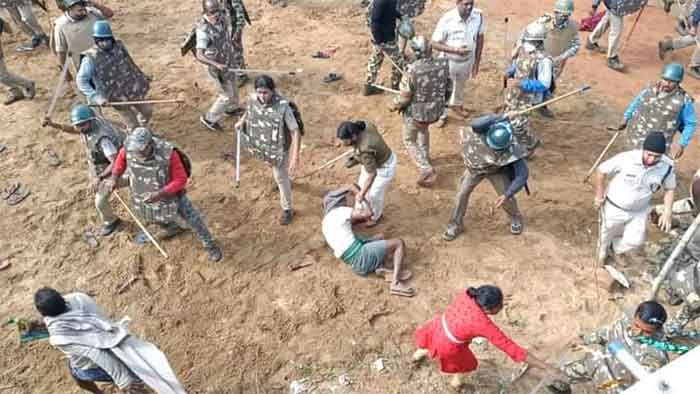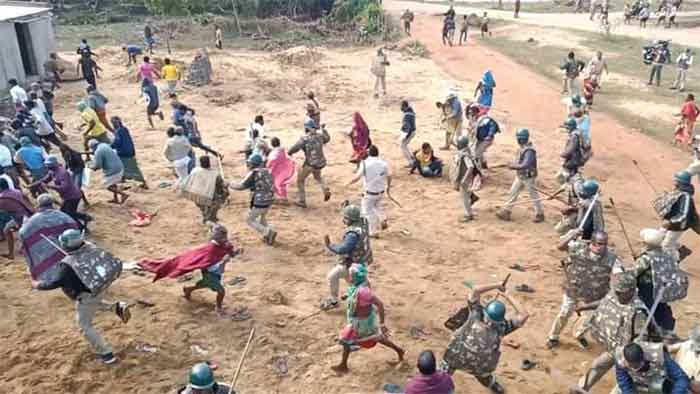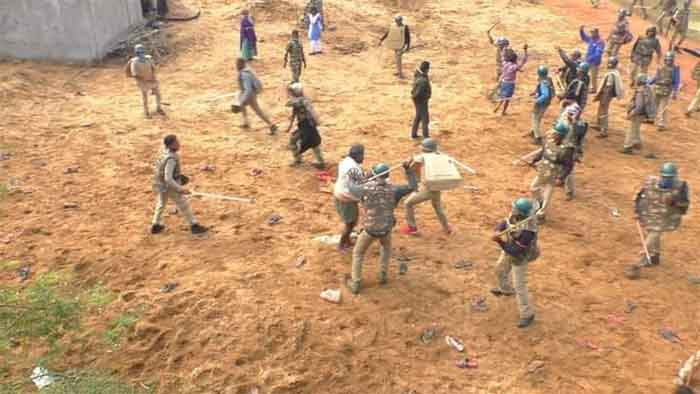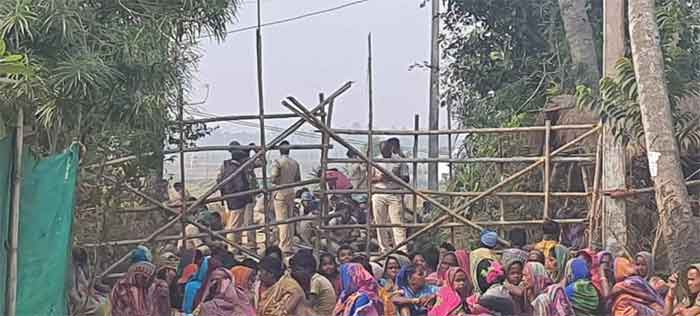
The social movement, called POSCO Pratirodh Sangram Samiti (or ‘anti-POSCO people’s movement – PPSS) is based in Odisha, India. The PPSS came together in 2005 to resist the development of an integrated steel complex by the South Korean POSCO corporation. It is estimated that, if the project were to go forward, it would displace up to 20,000 people from their lands and livelihoods and will have serious effects on the right to food, right to water, right to work, right to adequate housing and a range of other economic and social rights of the affected communities. A full documentation of the existing and anticipated human rights impacts of the project was published in 2013 by ESCR-Net and the NYU Law School’s International Human Rights Clinic, following a fact-finding mission conduced in 2012.
The largest potential source of FDI in India to-date, the project enjoys powerful backing within India’s political and economic elite. As a result, numerous human rights defenders who have expressed concerns about the project’s impacts have faced numerous types of reprisals. At least four persons have been killed and many injured in clashes between villagers and the police (and, often, with the involvement of pro-company thugs). A least 420 individuals have been charged in connection with the defence of the human rights of communities affected by the project, in part, due to warrants issued by local police against unnamed people. These are warrants that typically contain one or two names and then are attached with the phrase ‘and others’.
In a significant development, in March, 2017, the POSCO corporation suspended the project and has since confirmed that it will not pursue the steel plan in Odisha. While celebrating this important victory, the PPSS continues to be overwhelmed with the multiple criminal charges (which they allege are baseless) against their members, apparently in reprisal for their human rights activities. The criminalization of these grassroots defenders has had the effect of draining immense financial resources out of a volunteer social movement comprised of small farmers, who are struggling to cover the costs of legal defence.
Criminalization of villagers opposing the project
A report published in February 2013 by the Alternative Law Forum and Delhi Forum titled “Captive Democracy: A Fact Finding Report On Abuse of the Criminal System to Curb dissent against the POSCO Steel Plant in Odisha” established that, in February 2013, approximately 230 cases had been filed implicating between 1,500 and 2,000 villagers who had mobilized against the POSCO project between 2006 and 2012. Most of the charges left the number of accused open-ended (with warrants naming some individuals, followed b the phrase “and others”), which allows a great deal of discretion to the local police. A large number of these cases have been filed by government officials during peaceful demonstrations by the members of the PPSS.
By the end of December, 2016, the PPSS has seen 420 false or fabricated cases filed against their members. Following forcible land acquisition by the Indian Government in 2011 in the Gram Panchayat (local administrative units – all in Odisha) of Nuagaon and Gadakjunga and another land acquisition in 2013 affecting the village of Govindpur in the Gram Panchayat of Dhinkia, both to facilitate the POSCO project, the PPSS called on its members to reoccupy those lands. Villagers of the village of Gadakjunga heeded the call in 2014 and, in reprisal, POSCO filed cases against 30 individuals, including cases under the criminal code (section 447, 426) and civil cases alleging encroachment. In 2015, Villagers of Govindpur re-occupied the seized lands, prompting, the local government to criminal and civil cases against 40 more people who have mobilized to defend the rights and livelihoods of their communities. At present, the PPSS is struggling to provide legal defence for a total of 420 individuals (350+30+40, as described above).
In addition, warrants have been issued against 2,500 people, including 500 women. Of these, according to the PPSS’ local legal counsel, approximately 400 of these individuals were, in fact, arrested. The remaining 2,000 (approximately) have remained at permanent risk of arrest and being denied their liberty.
2018 onwards
The state government has planned to hand over the 2900 acres of fertile agricultural land Indian steel major Jindal Steel of the Sajan Jindal Group. JSW Utkal Steel Ltd came with its proposal to build 13.2 MTPA crude steel, 900MW captive power and 10 MTPA cement along with 52 MTPA Captive Jetty at the same place. All these are happening without free prior informed consent of our people and Gram Sabhas, and without following statutory legal procedures.
The Police have turned 11 village of three Gram Panchayats ( Dhinkia, Nuagan, Gadakujanga) in to an open house jail in the last 12 months . Amidst rampant arrests and targeting of activists, residents are now fleeing the village and living in fear. Villagers are now fleeing the village in a bid to escape arrests, the crackdown is brutal. On 13.12.2022, leaders like Ms. Shanti Das, Mr. Abhaya Mallick, Mr.Dillip Kandi, Mr. Narayan Muduli, Mr. Hrudananda Rout, Mr. Megha Das were arrested arising due PS Case No 02/2022 u/s 323, 341, 294, 307, 506, 34, of IPC and 3(1-r), 3(1-s), 3(2-v), 3(2-va) of SC and ST Atrocity Act 1989. Mr. Nutan Das was arrested again on dated 13.12.2022 arising due PS Case No 144/2022 which was registered on dated 10.04.2022 u/s 341, 323, 294, 307, 353, 332, 34 and 506 of IPC. He was previously arrested on dated 11.04.2022 and released by Bail on 18.05.2022 for other cases. On 27th of December 2022, Mr. Ananta Swain of Dhinkia village was arrested. Mr. Debendra Swain, the leader of the movement is languishing in the jail. The police are threatening and beating up those who go out even for their daily work. Even today the police along with the administration are illegally cutting trees, forcibly destroying the betel vine plots, and demolishing the houses and asking people to sign on plain paper.
During the course of the last one year, the police have set up at least three camps in the region – with intent to attack protesting villagers and suppress the movement. Already over-60 arrests and releases of activists by bail has taken place over the last six months. There are estimated 80 criminal cases against a thousand people. This is aside from the over-400 allegedly fabricated criminal cases pending against 2,500 people during the Anti-POSCO Movement.
The activists like Ms. Medha Patekar, Mr. Prafulla Samantara of the National Alliance of People’s Movements (NAPM) were stopped from visiting the site and taking up the issue with the locals. The company’s goons in connivance with the police forces are attacking villagers and unleashing a crackdown in a bid to benefit the company and take away the land of the community. This is not just a struggle for our land, but also simultaneously a battle for our survival and our livelihood.
The police, administration & project proponent (JSW) are illegally and forcefully demolishing the residential Houses and destroying the betel vineyards indiscriminately which are the only sources of livelihood of around 25,000 people residing in the area. The area has a sustainable, vibrant agricultural economy—and the government wants to destroy it by building a steel plant. The economy of the region is dependent on these betel vines which are sold to major cities. Also, the communities have been cultivating betel vines on forest land and their claims for titles were not settled.
The project also violates India’s legal frameworks. The non-compliance of the requirement of prior consent of the affected families under section 2(2) (b) [of the Land Acquisition Act] also renders the process of acquisition illegal and arbitrary. According to the Right to Fair Compensation and Transparency in Land Acquisition, Rehabilitation and Resettlement Act (LARR) of 2013 “land acquired and possession taken over but not utilized within a period of five years from the date of possession shall in all cases revert back to the original land owner.” Yet, ignoring this provision, the Odisha government on February 7, 2015 declared, “land acquired… but not utilized within a period of five years from the date of possession shall in all cases revert back to the state and be deposited in the Land Bank automatically.”
According to the 2006 Forest Rights Act, industrial projects diverting protected forest resources need to secure the consent of the impacted communities, through resolutions taken in the Gram Sabhas (village councils). On several occasions the Gram Sabhas of Dhinkia and nearby villages have passed majority resolutions against any handover of their lands and community forest resources, which are key to sustaining their livelihoods and a healthy environment. These resolutions have been routinely disregarded. You may remember that three different official committees i.e., the Saxena Committee, the POSCO Enquiry Committee and the FAC found that the law was violated in the proposed POSCO area.
As most of the villagers belonged to the scheduled caste category as well, the state has a constitutional responsibility under Article 46 to promote and protect the economic and educational interest of SC and ST groups.
The Demands
* The administration should take steps for immediate withdrawal of police force from Dhinkia area and ensure that normalcy is restored soon.
* The government should stop all types of repression on our people and withdraw all false and fabricated cases against our people.
* The government of Odisha must follow the Supreme Court’s ruling on the Singur issue in which the land of farmers bought for the Tata Nano plant was returned to them,
* Urgently process individual and community forest rights claims on land it had taken over for a POSCO project instead of transferring the land to a land bank.
* Declare that there is no provision under law or under any act which provides for land acquisition for any land bank for any purpose. Thus the land must return to the original inhabitants as per the Right to Fair Compensation and Transparency in Land Acquisition, Rehabilitation and Resettlement Act (LARR) of 2013.
* Ensure implementation of the judgment of NGT, Principal Bench, New Delhi dated 12- 07-2018 and remove any construction already made on the forest land.
* The government needs to replant the trees in our sensitive coastal areas where more than two lakh trees were indiscriminately cut down by the Government for POSCO.
* A committee consisting of sensitive jurists, human rights advocates, activists, ecologists and ecological economists should be formed to keep a watch on what the government is doing in our area to promote corporate interests at a huge cost to our native people and their permanent sources of livelihoods which are part of an ecologically sensitive coastal zone.
Prasant Paikray, Spoke Person, Anti-Jindal & Anti-POSCO Movement, Odisha, India













































